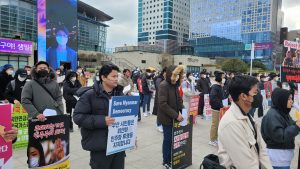While global attention is drawn to the crises in Crimea and the Gaza Strip, the severe human rights violations in Myanmar have continued unabated since the 2021 military coup. According to a recent report by the Office of the United Nations High Commissioner for Human Rights (OHCHR), the Myanmar military regime has intensified its use of brutal campaigns. These include the burning of villages, executions, killings, and torture. Arbitrary detentions, forced displacement, and denial of humanitarian access are also prevalent. The OHCHR report emphatically stated that some of these acts amount to crimes against humanity and war crimes.
Among the complex dynamics surrounding Myanmar’s situation, the diminishing space for domestic civil society groups and citizen participation is particularly alarming. This is due to the military’s tightening grip over all aspects of life.
According to the monitoring mechanism established by CIVICUS, a Geneva-based global civil society alliance, the state of civic space in Myanmar is rated as “closed.” This rating signifies a critical suppression of civil liberties within the country, leaving scant room for civic groups to operate freely or for citizens to express dissent without facing severe repercussions. Such an environment stifles democratic engagement and pushes the country further from global human rights standards. In light of these conditions, Myanmar will likely remain alienated from the international arena for the foreseeable future.
This high level of repression underlines why the Myanmar diaspora is playing an increasingly significant role in restoring international attention and support for Myanmar’s fight for democracy and human rights. As the domestic space for activism shrinks under the military’s control, the diaspora emerges as a crucial advocate on the global stage, mobilizing communities, governments, and human rights organizations to take action.
One noteworthy segment of the Myanmar diaspora is those residing in South Korea. These individuals have established several organizations, collaborating with each other and their Korean supporters, presenting a unique repertoire of skills within Myanmar’s anti-coup movements.
The most visible among these is the National Unity Government (NUG)’s representative office in Seoul. The NUG serves as the democratic shadow government of Myanmar, established by opposition groups and members of the ousted civilian government following the 2021 military coup. Since its establishment in August 2021, the NUG’s Seoul office has notably raised over $12 million through various fundraising efforts to support the NUG.
For instance, the Seoul office introduced the “One Day Challenge,” an initiative where Myanmar workers donate the equivalent of one day’s earnings from their monthly salary to the NUG. With these and other strategies for raising much-needed financial support, the NUG’s Seoul office undoubtedly will continue to play a pivotal role in coordinating international advocacy and support for Myanmar’s democratic restoration.
Additionally, the NUG’s Seoul office collaborates with several civil groups formed by the Myanmar diaspora in South Korea. Groups such as Youth Action for Myanmar (YAM), formed by Myanmar youths residing in Korea, exemplify the active engagement of the diaspora in advocacy and protest activities. YAM frequently collaborates with the NUG’s Seoul office to organize protests, participates in interviews with broadcasting stations, and holds talks and meetings with political leaders and Korean civil society organizations (CSOs). Their efforts aim to garner interest and support from the Korean public and international community, highlighting the ongoing crisis in Myanmar and mobilizing action for change.
Furthermore, Korean civil society organizations play an essential role in this tripartite model of solidarity. Their contributions include organizing protests in collaboration with the Myanmar diaspora in South Korea, providing logistical support, and co-organizing events to increase awareness of Myanmar’s circumstances both within South Korea and internationally. This joint effort between the Myanmar diaspora and Korean CSOs strengthens the global network advocating for Myanmar’s democratic movement, thus enhancing its visibility and effectiveness.
For example, organizations such as the Korean Solidarity for Overseas Community Organization in Asia, People’s Solidarity for Participatory Democracy, Korean House for International Solidarity, Korean Metal Workers’ Union, and over a hundred other Korean CSOs have consistently shown their solidarity with those fighting for democracy in Myanmar and continue to exert pressure on Korean companies that maintain business relations with Myanmar’s military regime.
By synthesizing the efforts and resources of the Myanmar interim government’s representative office, the Myanmar diaspora, and Korean CSOs, what has been witnessed in South Korea three years since the coup in Myanmar is the creation of a stronger platform for initiating change and engaging in global conversations. The solidarity between these three forces in South Korea serves as a beacon of hope not only for communities back home in Myanmar but also for Myanmar diaspora communities around the world. It stands as a strategic model for populations under oppression elsewhere, highlighting the effectiveness of united efforts against authoritarian regimes.
In summary, the unity and strategic collaboration seen in South Korea highlight the essential role of diasporic communities in sounding the call for change, merging local initiatives with broader support. Such unified actions make the goal of achieving democracy and human rights in Myanmar more achievable, motivating movements globally to leverage diaspora strength and worldwide backing in their quests for justice.

































